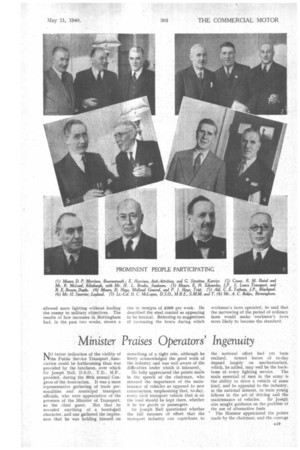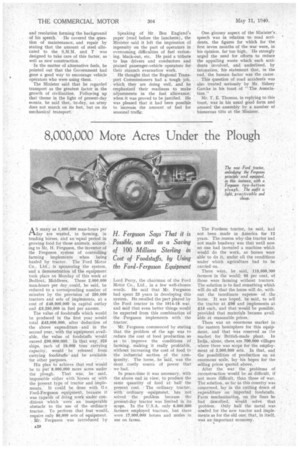Minister Praises Operators' Ingenuity KTO better indication of the virility
Page 21

Page 22

If you've noticed an error in this article please click here to report it so we can fix it.
of 1 lithe Public Service Transport ,Association could be forthcoming than was provided by the luncheon, over which Sir Joseph Nall, D.S.O., Ti)., M.P., presided, during the 30th annual'Congress of the Association. It was a most representative gathering of trade persenalities and municipal transport officials, who were appreciative of the presence of the Minister of Transport, as the chief guest. Not that he revealed anything of a bombskell character, and one gathered the impression that he was holding himself on
something of a tight rein, although he freely acknowledged the good work of the industry and was well aware of the difficulties under which it. laboured.
He fully appreciated the points made in the speech of the chairman, who stressed the importance of the maintenance of vehicles as opposed to new construction, emphasizing that, to-day, every civil transport vehicle that is on the road should be kept there, whether it be for goods or passengers.
Sir Joseph Nall questioned whether the full measure of effort that the transport industry can contribute to the national effort had yet been realized. Armed forces of to-day depend largely • on mechanization, which, he added, may well be the back bone of every fighting service. The main essential of men in the army is the ability to drive a vehicle of some kind, and he appealed to the industry, in the national interest, to train young fellows in the art of driving and the maintenance of vehicles. Sir Joseph also sought guidance on the problem of the use of alternative fuels.
The Minister appreciated the points made by the chairman, and the courage and resolution forming the background
of his speech. He covered the question of maintenance, and repair by stating that the amount of steel allocated to the S.M.M. and T was designed to take care of this factor, as well as new construction.
In the matter of alternative fuels, he pointed out that the Government had gone a good way to encourage vehicle operators who were using them.
The Minister said that he regarded transport as the greatest factor in the growth of civilization. Following up that theme in the light of present-day events, he said that, to-day, an army does not march on its feet, but on its mechanical transport. Speaking of Mr. Ben England's paper (read before the luncheon), the Minister said it left the impression of ingenuity on the part of operators in overcoming, difficulties of fuel rationing, black-out, etc. He paid a tribute to bus drivers and conductors and praised passenger-vehicle operators for their staunch evacuation work.
He thought that the Regional Transport Commissioners had a tough job, which they are doing well, and he emphasized their readiness to make adjustments in the fuel allowance; when it was proved to be justified. He was pleased that it had been possible to increase the amount of fuel for seasonal traffic. One gloomy aspect of the Minister's speech was in relation to road accidents, the figures for which for the first seven months of the war were, in his opinion, far too high. He strongly urged the need for efforts to reduce the appalling waste which such accidents involved, and underlined, by intonation, his statement that, in the end, the human factor was the cause.
This question of road accidents was also treated seriously by Mr. Sidney Garcke in his toast of " The Association."
Mr. T. E. Thomas, in replying to this toast, was in his usual good form and amused the assembly by a number of humorous tilts at the Minister.




























































